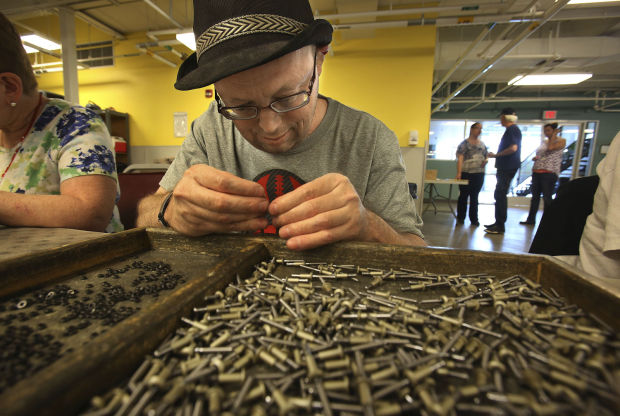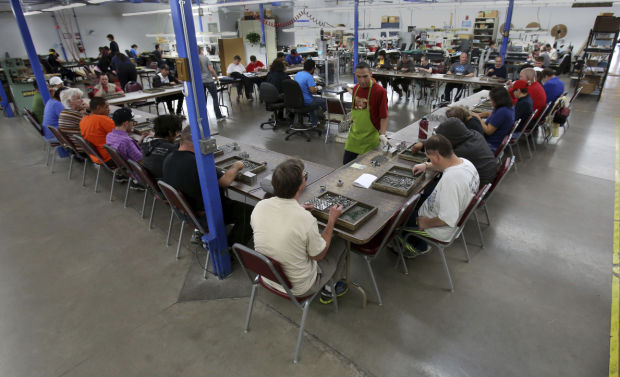Jennifer O’Neill averages a mere $70 each payday putting together airplane rivets, but she could get a raise when Tucson, like the rest of the country, begins boosting wages and phasing out segregated workplaces for people with disabilities.
You might guess she’s thrilled at the prospect of bigger paychecks. Actually, her mom says, no.
A national movement to help people with disabilities enter the workforce imposes what can be a frightening change away from what’s familiar for people with developmental and intellectual disabilities, like O’Neill, who has Down syndrome. The idea is to offer people — even those with severe disabilities — jobs in integrated workplaces throughout community, and to provide the necessary support and training to help them succeed.
O’Neill, 40, has worked with Tucson’s Beacon Group since she was in high school. She has friends there, she knows the routine and her interest in money doesn’t extend beyond having a dollar to buy a soda, said her mother, Dee O’Neill.
“She should not have to compete in the regular, competitive employment market because she will never, ever get a job,” Dee said. “It would take four of her to do whatever needs doing at the time.”
But civil rights experts and activists say people with disabilities deserve to be offered other opportunities. Many people working in center-based employment like Beacon are stuck there, they say, doing contract work for little pay when they could do something far more stimulating. The potential for abuse and exploitation is also immense in some of these “sheltered workshops,” they say.
Many organizations providing subcontract work for people with disabilities get fixated on meeting production demands, and so what starts as a pre-vocational training opportunity results in people being there “for years and years and years,” said Curtis Decker of the National Disability Rights Network.
“If they can shred, why can’t that happen in the building of the business paying for the shredding? It’s not only the submiminum wage, but the segregation,” Decker said. “Let’s bring them out of the shadows. Let’s look at technology and to experts to help them get into employment.”
People who work at Beacon’s huge warehouse, at 308 W. Glenn St., carry out multiple subcontracts that might involve making airplane rivets, working in shredding or helping with shipping orders, many for wages below or far below the state minimum of $7.90 per hour.
Patrick McCarthy, Beacon’s director of development, said those who want to phase out sheltered workshops have made “numerous erroneous assumptions” about the organizations and the people they serve. There are worst-case scenarios in which workers were mistreated and exploited, but also plenty of workshops where people with disabilities succeed, he said.
Some Beacon workers have been hired at outside companies but chose to return because they “prefer to work here in a supportive environment,” he said. Others have been ripped off at stores, or assaulted when they are alone in the community, he said.
“This is an active choice clients and their families are making,” he said. “There are bigger issues here. People want to know where their son or daughter is and who they are with. Being safe is much more important than money.”
the olmstead mission
Since President Obama took office, activists have gained momentum in helping people with disabilities. First came changes related to segregated living situations and now the focus is shifting to sheltered workshops, where roughly 500,000 people with disabilities work nationwide.
The shift is tied to enforcing a 1999 Supreme Court decision that people with developmental or intellectual disabilities have the right to live in the community, not in institutions. That Georgia case, Olmstead v L.C., led to what’s now called Olmstead Enforcement.
Decker’s organization helped the U.S. Department of Justice’s Civil Rights Division enforce Olmstead in Rhode Island, where a recent investigation found the state over-relied on segregated employment. (For more information on Olmstead Enforcement, visit ada.gov/olmstead/).
Rhode Island, the first state to reach an Olmstead settlement over employment, is now required to provide job opportunities to 3,250 residents with intellectual or developmental disabilities over the next 10 years. Some of those people are now in sheltered workshops while others are in non-work programs or still in high school.
“We hope that states will pay attention to the Rhode Island agreement and will refer to it to make changes on their own,” said Eve Hill, assistant attorney general with the Department of Justice’s Civil Rights Division. “Some states are already trying to do that.”
In the Rhode Island case, the U.S. Department of Labor investigated a large sheltered workshop and found significant wage violations.
“Many of those people were clearly able to work in integrated employment,” Hill said.
The court settlement does not force Rhode Island to close all of its sheltered workshops, she said, but it does require each person be offered a job in an integrated setting.
“If they want to stay (at a sheltered workshop), they can choose that,” she said. “One of the problems is that they don’t know what the integrated options are because they’ve never been offered one.”
Helping people make informed choices is part of the Olmstead mission, she said.
“We want to challenge the assumption that all people with a particular kind of disability can’t work in an integrated setting,” she said. “We hope that (states) will try to shift their priorities and make integrated settings the norm instead of the exception.”
She said change begins with finding jobs that match a person’s interests and potential. “We saw a lot of mismatching,” she said.
Ultimately, Hill said some people might work fewer hours for higher wages, and then participate in an integrated day program to round out a 40-hour week.
“What the activities are depends on what the person wants,” she said of the day programs envisioned. “A person should be able to fill the day with things that are meaningful to them, and have a factor of choice with them.”
boosting wages
Goodwill Industries of Southern Arizona has already started making significant changes to comply with Olmstead, said Marlena Collins, a workforce development compliance officer for the organization.
“We are moving people who are able to safely move into our stores in a group-supported employment environment,” she said. In all, 21 positions have been created. Other people who were working in Goodwill’s sheltered workshop here now have jobs scanning e-books, also in an integrated setting.
But the question of wages remains unanswered.
“I honestly can’t tell you what percent of people are going to make progress to making minimum wage,” she said. But she hopes increased training and job coaching will help people move toward higher wages.
Rich Bechtold said increasing pay to minimum wage spells the end for the nonprofit plant nursery Desert Survivors. Bechtold is the executive director of the 20-year-old Tucson organization, which provides group-supported employment for people with disabilities.
While Bechtold said he supports integrated employment whenever possible, he said there are “inherent dangers” in pushing for higher wages.
“It’s not about the money, it’s about more people going into daycare programs,” Bechtold said. “There’s no comparison to being here, potting and watering plants. What are they going to do all day? Glue macaroni on plates?”
Bechtold said 42 men with a variety of disabilities work each day at Desert Survivors.
“These guys can work and they take pride in it,” he said. “We all identify ourselves by where we work.”
compliance challenges
Yet another challenge Dee O’Neill said must be considered when discussing higher wages: Her daughter Jennifer, like many other people with a significant disability, receives government services that would be revoked if she earns too much.
“In order for her to be eligible, she must meet certain requirements,” Dee O’Neill said. “She can’t earn more than $2,000, for example.”
President Obama’s recent executive order requires all federal employees, including workers with disabilities, to receive a minimum wage of $10.10 per hour. When the order takes effect next January, it will override the Fair Labor Standards Act of 1938, which let certified employers pay subminimum wages, based on productivity, to workers with disabilities.
For the nonprofit Beacon Group, the change will impact employees with service jobs on federal sites, such as U.S. District Court and Border Patrol offices.
“In our case, there will be people who will lose their jobs or will have to go on to something else,” said McCarthy, Beacon’s director of development. He said some workers on these crews already earn $10.10 or higher.
“Our approach is that, if they are close, we will close up their pay and leave them there,” he said. “But for those who are not close, they will have to move to another job.”
Arizona’s Division of Developmental Disabilities requires at least 10 percent of all those working in sheltered workshops be either identified for, or making progress toward, community employment each year.
Beacon’s vice president of rehabilitation, Chuck Tiller, said in an email that 215 people working in Beacon’s center-based programs had an individual-support planning meeting last year to discuss such a move.
Of those 215 individuals, 31 — or 14.4 percent — began transitioning toward community employment. Of the other 184 individuals, an interdisciplinary team, parent or guardian, or the individual themselves, chose not to pursue community employment.
Over the years, Beacon worker Scott Woodward, 38, has had more than a dozen opportunities to work in the community, but each time the job didn’t work out because Scott wasn’t able to stay on task, his father said.
“Scott is very sociable, but he doesn’t have a tendency to work,” Skip Woodward said. Scott has 9p Minus Syndrome, a rare chromosomal abnormality that occurs in 1 in 50,000 births. Woodward said the idea of phasing out sheltered workshops frustrates and baffles him. “It’s very typical of what the government does,” he said. “They will pass sweeping legislation that affects a lot of people who are not doing anything wrong.”
Beacon Group, which started here over 62 years ago, not only provides center-based employment, but also supported employment in the community as well as job placements with more than 22 local employers.
About 1,200 people work or receive services through Beacon annually, and roughly 70 percent have developmental disabilities. Those who are capable are trained for jobs in the community, McCarthy said, either with the support of Beacon or on their own.
Some people at Beacon receive employment counseling from Tucson’s Linkages, which helped 855 people with disabilities find work last year with one of about 200 local employers. Many of those were Beacon referrals.
Republican State Representative Ethan Orr, Linkages’ executive director, said about half of the people Linkages assisted are developmentally disabled, while a third are seriously mentally ill. The rest have other kinds of disabilities.
“We do a little bit of job training, but we mainly focus on competitive job placement,” he said. “Beacon does the training.”
A similar Tucson organization is DKA Inc. Rehabilitation Services, which Dot Kret started in order to help more people with disabilities transition into regular jobs.
With restructuring and training, Kret believes more people could work in the community and fewer people would need a sheltered workshop. But she doesn’t think phasing out sheltered workshops altogether is realistic, especially for people whose developmental disabilities are severe enough to make it hard for them to succeed at a traditional job.
“Even people with severe disabilities want to work,” she said. “Everyone should be given that dignity and that opportunity.”






